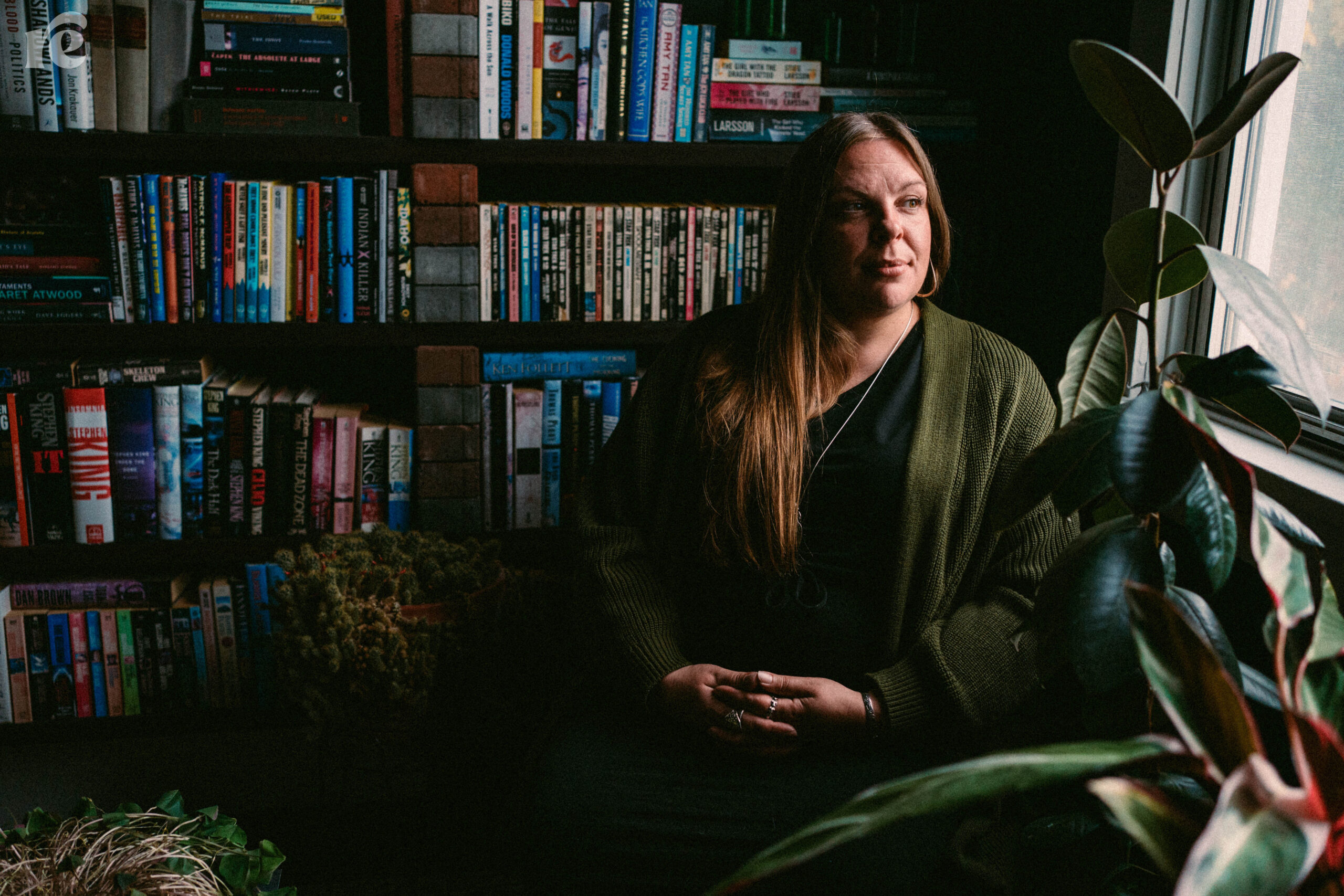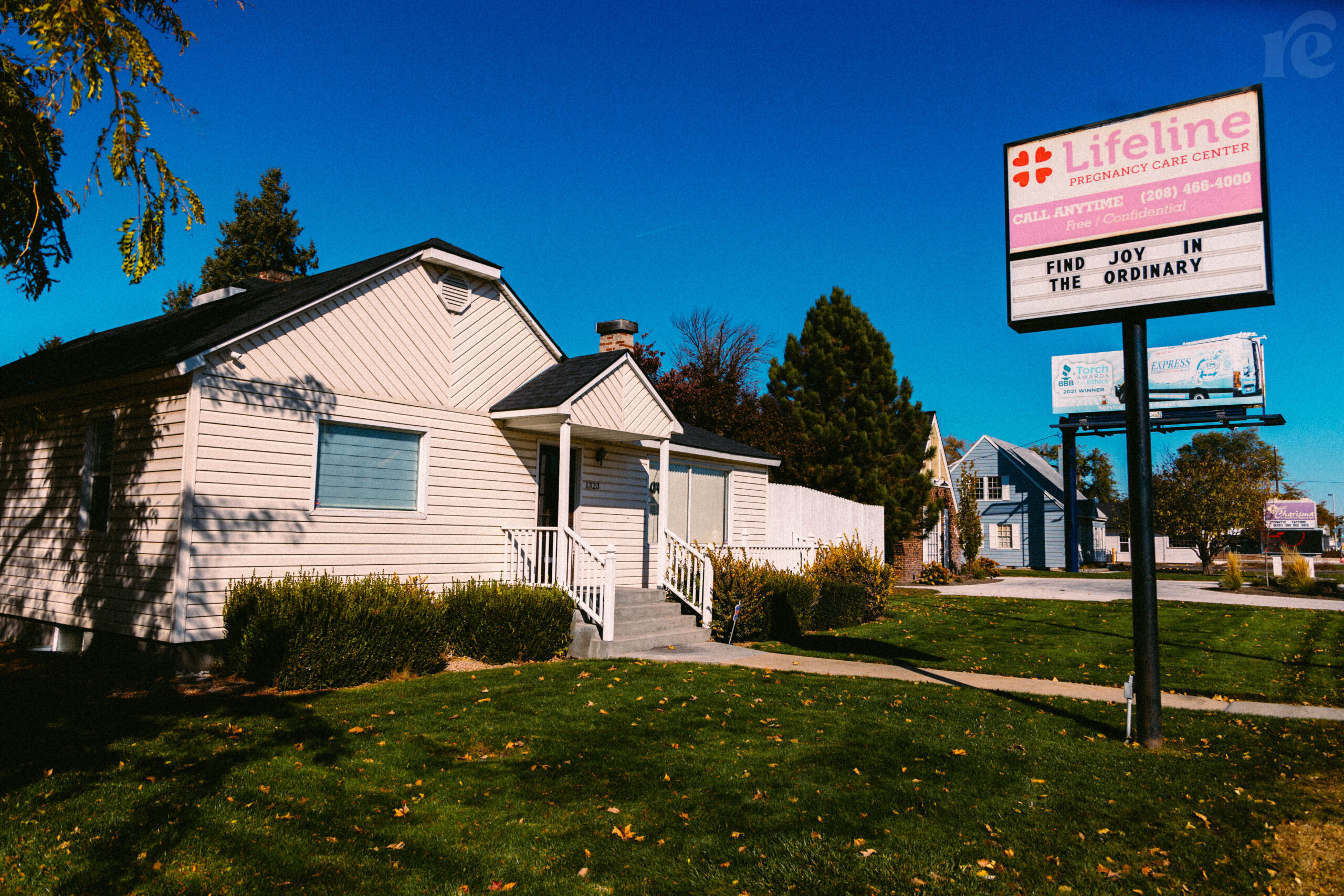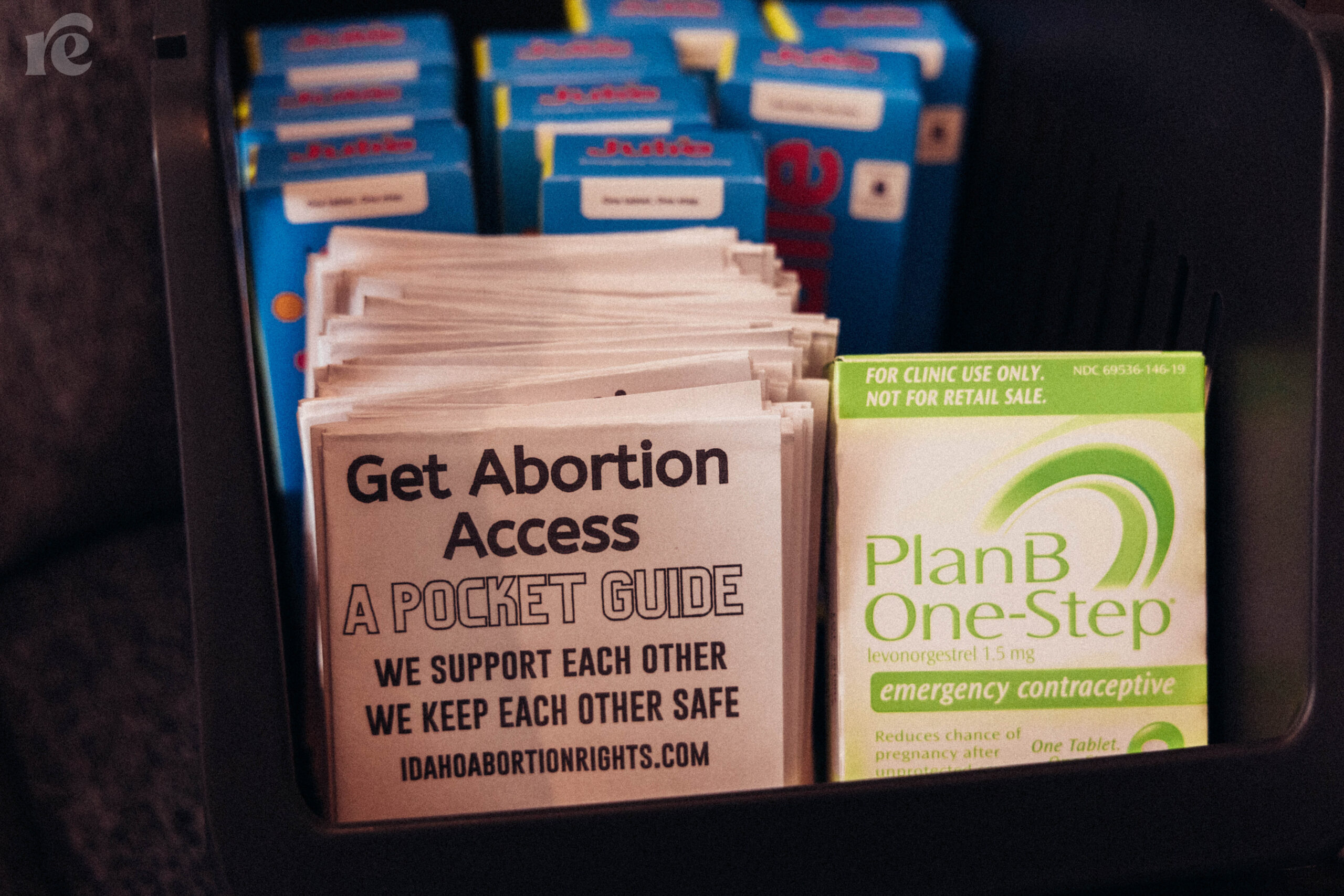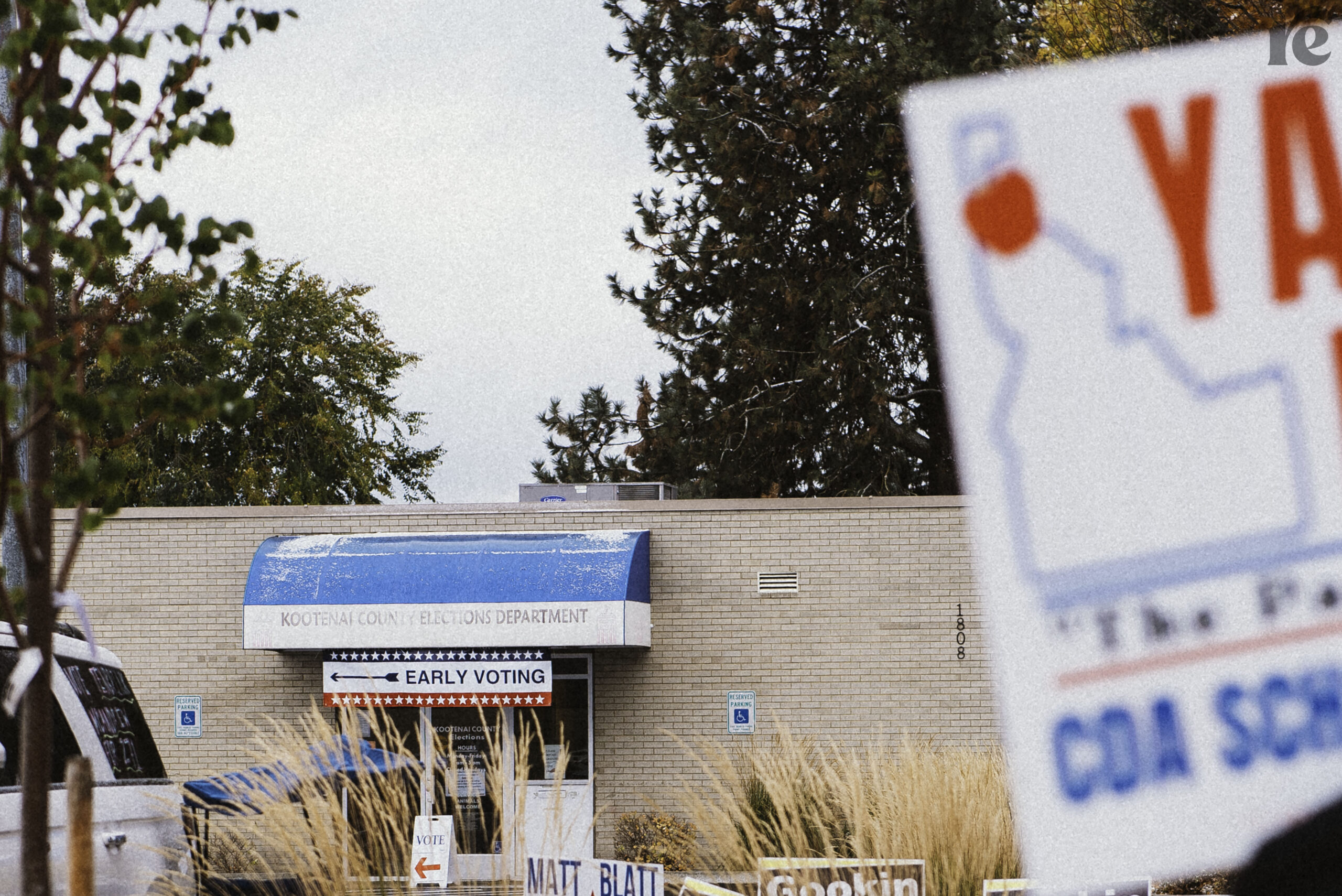The Plan to Win Against Extremism in Idaho
Some people—especially doctors—are leaving Idaho, fleeing extremism. Others are choosing to stay and fight, despite the risks.
This reporting was supported by the International Women’s Media Foundation’s Reproductive Rights Reporting Fund.
It is the final installment on the reproductive health crisis and Christian nationalism in Idaho. Check out the full three-part series here.
In summer of 2022, 31 members of the white nationalist organization Patriot Front were arrested in Coeur d’Alene, Idaho. They had arrived in the city—North Idaho’s largest, with a population of about 56,000—with a plan to start a riot at Pride in the Park, an annual LGBTQ+ pride event. They arrived in a U-Haul truck carrying masks, shields, and other riot gear. Their arrest sparked something of a media frenzy.
But when I met with locals in Coeur d’Alene and nearby Sandpoint, they said they felt that much of that media coverage missed the mark. For one thing, almost all of the Patriot Front members arrested that day (five of whom were later convicted of conspiracy to riot) came from out of state—several from as far away as Texas.
Anti-fascist organizers in Idaho said they viewed that incident—and subsequent actions carried out by Patriot Front members in Idaho—as an attempt on the group’s part to create the perception that they have a bigger presence in the state than they really do. This would be consistent with Patriot Front’s general approach: The Southern Poverty Law Center, which designates Patriot Front a hate group, calls its members “image-obsessed.”
However, residents say the outsized media attention on Patriot Front overshadowed the threat they felt on that day from local groups that do have a strong presence in their communities. It also failed to capture the resistance to fascism and Christian nationalism that I encountered in every part of Idaho I visited.
It’s true that some people—especially doctors—have chosen to leave Idaho because of its political environment, which includes bans on abortion, and soon, gender-affirming care for children and teens. But plenty have chosen to stay. And in all sorts of different ways, they’re working to claw their state back from the jaws of extremism.
A community responds

Alicia Abbott, a political organizer who lives in Sandpoint, made the one-hour drive down to Coeur d’Alene to volunteer at Pride in the Park 2022.
“I looked in my rearview mirror and I saw this white truck barreling down the highway, way fast, and they passed me,” Abbot said. “And on the back of their window was just a loud and proud white Nazi black sun.” (The black sun, or sonnenrad, is one of several ancient Norse symbols appropriated by Nazis during World War II, and also used by neo-Nazi groups.)
“I said, is today the day? Is today the day you’re going to be in a crowd that gets shot at? Because the Nazis are up real early, “ Abbott added. “They stood in that fucking park, 80 of them, all day long with semi-automatic weapons flanking an event … Everybody likes to focus on those people in the U-Haul that got arrested, and I’m like, you don’t even realize that we spent eight hours literally being flanked by people with loaded semi-automatic weapons.”
But just as many of the reports from that day don’t go into detail about local extremists—who are regulars at events like Pride in the Park—they also don’t capture the community response to them.
“There was a group of us who worked to identify a lot of the people that were coming—the dangers. We were getting that information out there,” said Casey, a former abortion “abolitionist” who is now an anti-fascist organizer, and whose name has been changed to protect their safety. In fact, activists worked to create a physical barrier between Pride in the Park attendees and neo-Nazis who came to demonstrate at the event.
“Patriot Front came in, they stole the show … it was very important, but it kind of took away from the local activists who had been working for years to keep the community safe,” Casey added.
When I was in Boise in October, I met with a group of anti-fascist activists who had recently pulled down a banner that Patriot Front dropped from a highway overpass. “OUR TOLERANCE IS AT AN END,” it read.
Patriot Front had dropped several banners that day. Activists told me that all of them were pulled down quickly, thanks to swift community action. Most of the Patriot Front members who participate in such demonstrations, the activists said, come in from out of town. Even still, they feel it’s important to push back, every single time.
“We have to show that queer lives are worth living in Idaho,” one of them told me.
The activists hung the banner upside down and spray painted it with a three arrows symbol, a mark used by resistance fighters to deface the swastika in Nazi Germany and also used by contemporary American anti-fascists. Then they set the banner on fire, and let it burn until nothing was left.
Impact on abortion

It’s no wonder that Patriot Front, an overtly fascist group, would want people to see it as having influence in Idaho. For one, Idaho is part of several different white, Christian nationalist visions for utopia, including the Northwest Territorial Imperative and the American Redoubt. It was also one of the first states to ban abortion after Roe v. Wade was overturned, and not just that: Lawmakers there have continually looked for new and different ways to make it impossible for people to access abortion, including a first-of-its-kind ban on “abortion trafficking.”
Reproductive control is a key element of fascism; historically, it’s one of the first developments in a fascist system. So in Idaho, extremists see a blueprint for their Christian nationalist fantasies. And it’s true that Idaho is, by and large, a conservative state. As a result, people there suffer from the fact that many outsiders see them as a lost cause, despite the fact that many of them are working hard to fight extremism.
“I think it’d be a little bit pessimistic to say, too little, too late, but … living here between 2003 and 2016, it was very difficult—if not impossible—to get the attention of anybody outside of Idaho who was deploying any kind of resources anywhere,” said Ritchie Eppink, an attorney who has worked for Idaho Legal Aid and ACLU of Idaho, and is now part of the “community-funded, sliding scale nonprofit law firm” W/REST. “At least in terms of the broader nonprofit industrial complex, a lot of the conversations, the attention, were focused on the so-called ‘purple’ states, the places that people saw as strategic in a partisan political way.”
But after Donald Trump was elected president, Eppink said, suddenly there was interest in Idaho, and broader recognition of its status as an incubator for extremism. “And then literally within a matter of months, we started to get phone calls about, ‘Do you want some money?’” they said.
Sometimes, though, that “lost cause” fallacy still exists. For example, Wendy Heipt, senior reproductive health and justice counsel at Legal Voice, said many people told her organization it wasn’t worth it to challenge Idaho’s “abortion trafficking” ban. Wait for a state that’s more “strategic,” they said.
Legal Voice went ahead with the challenge anyway.
“Idaho has been the proving ground for other really extremist legislation that has taken off around the country,” Heipt said. “So I feel it’s really important to challenge that the minute it drops, both to prove that it’s a law that shouldn’t stand, and to give fair warning to other legislatures that these things do not go unnoticed. Not to mention providing hope for all the communities in the state that are impacted because their rights are being taken away.”
Legal Voice, which had been doing work in Idaho for a little over a decade, now has three full-time staff members working in the state on litigation and policy advocacy. The “abortion trafficking” ban, which Legal Voice refers to in less inflammatory terms as an “abortion travel ban,” made it a crime for a non-parent or guardian to assist a minor seeking an abortion in Idaho. Enforcement of the law is currently blocked by court order as the challenge proceeds. Legal Voice is also involved in the challenge to an Idaho law that would ban trans women and girls from playing women’s sports.
Yet another reason it was important for Legal Voice to enter this melee, Heipt said, is that the Idaho state legislature will be back in session in January.
“The legislature is perhaps not representative of the people of the state, who I think as a whole prefer more individual freedom and individual choice than this legislature is giving them,” she said. And keeping last year’s legislation in the news reminds people of that.
Significant barriers to care

One of the plaintiffs in the abortion travel ban lawsuit is Indigenous Idaho Alliance (IIA), an organization that works with Indigenous communities in the state—communities, not tribal governments, which is an important distinction to founder Tai Simpson.
Simpson founded IIA in 2012, when Indigenous-led efforts to stop the Keystone Pipeline were gaining momentum. Soon after that, the proliferation of “man camps” housing pipeline workers began to exacerbate the existing crisis of missing and murdered Indigenous women and girls, which cemented the importance of IIA’s advocacy work. Reproductive justice and access to health care in general are among the group’s central priorities.
It was important for IIA to join the challenge to the abortion travel ban, Simpson said, because they see it as a continuation of a long history of violence toward and displacement of indigenous people.
“Indigenous people are imprisoned on reservations and now we’re making it worse by saying, ‘You can’t move,’” Simpson said. “And I don’t think anybody thought about how that lands when we’ve already endured that experience for so long.”
“Indigenous communities, including my own, have been practicing abortion and womb care for generations. Long before the word ‘abortion’ became a thing,” Simpson added. “We have medicines that grow naturally everywhere in the United States that when ingested will produce an abortion … And that’s been in practice for thousands, thousands of years.”

And while there was already an abortion fund, Northwest Abortion Access Fund, serving Idaho, other efforts have sprung up to meet growing needs. Idaho Abortion Rights, for example, has placed more than two dozen reproductive health boxes in businesses throughout Idaho, which contain information on accessing abortion, pregnancy tests, emergency contraception, condoms, and more. They also send post-abortion care kits by mail and help refer people to local clinics for any follow-up care they may need after traveling out of state to have an abortion.
Physicians and other medical professionals have come together to form the Idaho Coalition for Safe Healthcare, seeking to reverse Idaho’s anti-medicine laws and stem the tide of doctors fleeing the state.
And plenty of doctors are staying put, working to continue caring for their patients and navigating the fear and confusion created by the state legislature as best they can—though that doesn’t mean they aren’t struggling.
“I support my colleagues who are leaving Idaho,” said Penny Beach, a family medicine physician in Boise whose practice includes obstetrics. “It’s very difficult to practice in a state when all of a sudden what you provided yesterday as routine, good, standard-of-care medicine today will get you thrown in jail for five years and your medical license revoked. It does not feel good to be labeled a felon. It does not feel good to be told that you are the problem, that you should not be afraid to do medically necessary abortions regardless of the fact that doing so could cause you to lose your career, your freedom, and your income. It does not feel good to study for years and then be told that no one cares about the nuances of your medical knowledge. And most of all, it does not feel good to see your patients suffer needlessly.”
So far, Beach has chosen to stay put because she loves her job and her community. But “I think about leaving or retiring early all the time,” she said. Many Idahoans are still unaware of the abortion bans, she added. “Patients who are carrying babies with a lethal fetal anomaly are often stunned when they are told they have to go out of state to have an abortion,” she said. Others do know, and are terrified.
For example, Ashley Davis, also a family medicine physician in Boise, said she recently had a 34-year-old male patient come in asking for a vasectomy. Had he and his wife decided they didn’t want children, asked Davis?
No, the man said. He and his wife had been trying to have a baby for four years. But under Idaho’s current law, they were afraid that if she became pregnant and experienced complications, she’d be forced to carry a risky pregnancy to term.
“I just feel disheartened and frustrated,” Davis said. As a provider of gender-affirming care, she’s particularly concerned for her teen patients when the gender-affirming care ban goes into effect in January.
“I do have hope that things will swing back, but gosh, it takes so much effort,” she said.
‘The burden of risk is entirely on me’

There are significant barriers to progressive organizing in Idaho. Some of them are physical: Idaho is a big state, in terms of area if not in population.
“People in Idaho are both geographically spread out, and often out of touch with each other, especially those who are working on projects, movements, campaigns, whatever you want to call them, to resist various types of oppression, including this fascist acceleration,” Eppink said. “And we just do not have the organizing infrastructure that exists in other places.”
As a result of that lack of infrastructure, Eppink added, “there’s just a lot, I think, for many people to learn about how to practice solidarity and how to be involved in movements where there are going to be a lot of different ideas about how to get things done.”
Casey agrees. “I think it’s because leftists, or left-leaning people, liberals … generally are more ethical,” they said. “Whereas the right, they’re willing to sacrifice their beliefs in order to push a further agenda.”
Idaho’s extreme right wing is also extremely hostile and aggressive toward dissenters, or anyone who dares to challenge their power. I was presented with more examples of this during my time in the state than I can count, but there was one that stood out to many of my sources: The story of a young state legislative intern, who was raped by one of the legislators.
When the woman reported the assault, then-Rep. Aaron von Ehlinger—her attacker—and then-Rep. Priscilla Giddings, both far-right Republicans, doxxed her. One of their supporters still mocks her publicly, appearing at events dressed as a beauty queen and wearing a sash printed with the victim’s name and “Miss Idaho Capitol.”
“If a young white woman, who’s in the most sacred spaces of our democracy, is still treated with such incredible disrespect by other women? What does that say for everybody else? What message does that send to other people?” said Amy York, IIA’s operations manager.
There’s also the fact that putting your body on the line is dangerous, especially when you’re going up against fascist groups that often have sympathy—if not direct support—from police on their side.
Take the case of Avalon Hardy, a hairstylist and mom of six. Hardy is a longtime activist and organizer in Boise’s Black community. Her mom got her started in community work when she was just four years old, she told me. In June 2022, days after the Supreme Court overturned Roe, Hardy was arrested at an abortion rights protest at the Idaho state capitol.
The arrest happened after she confronted a member of the Idaho Liberty Dogs, a local militia group that often shows up to intimidate protesters at the capitol. He was hitting people with brass knuckles, and Hardy stepped in to interrupt the violence. There was a plainclothes police officer in the crowd, and minutes later, Hardy was arrested. Police never read her Miranda rights, she said. And after a video contradicting the police version of events was shown in court, in a very rare move, the judge acquitted her from the stand at what was supposed to be a jury trial.
But though Hardy was acquitted, the arrest still looms large in her life.
“I still protest, and I still am involved in activism, but I would have to say that I’m not as involved as I was before,” Hardy said. “I was the person that was willing to take the risk … now I’m quieter about it. I kind of stand to the back a little bit more.”
“I feel like I definitely have a target on my back … because it was so public, and I got doxxed,” she added. Hardy, represented by Eppink, is now suing the Idaho State Police for wrongful arrest.
Perhaps because of the threat of retaliation, many legislators are also “very cowed from setting both ends of the discourse out,” Eppink said, meaning that when a far-right legislator takes an extreme position, many of their colleagues are afraid to hold fast to the other side. That’s why it’s so important for individuals like Avalon, and groups like IIA, to “say … some of these things are so far beyond the pale that we are not going to work against them in a diplomatic fashion,” Eppink continued. “We’re going to work against them by saying, ‘This is where the line is.’”
Coalition-building work is also inherently challenging, and those challenges are only multiplied when systems of oppression are at work.
“These conversations are important and necessary to have when it comes to extremism, but it is also moderation that is equally as damaging,” Simpson said. “And it’s painful, especially on an interpersonal level. Especially because you either have to work with people that you can’t trust, or you have to avoid working with them and then not have access to some of the resources that they have. And the burden of risk is entirely on me. I’m the one that’s harmed … I don’t get to turn off Blackness, and indigeneity, and womanhood.”
Looking ahead to the 2024 election

In talking to people throughout Idaho, I encountered plenty of disagreement about what, exactly, it will take to win the fight against extremism. But everyone I spoke with agreed that a fight was necessary. And there was one effort that almost every single person I spoke with was excited about: the Idaho Open Primaries Initiative.
Prior to 2011, Idaho had an open primary system, meaning voters didn’t have to be registered with a particular party to vote in primary elections. In 2011, the Idaho Republican Party fought that system, and won, successfully closing the primaries, cementing a path to victory for extremist candidates, and effectively disenfranchising unaffiliated voters.
Idaho has an unusually large number of registered voters who aren’t affiliated with any party—as of 2020, they were the second-largest share of registered voters, after Republicans. Right now, those voters have no say in who the Republican nominee is. And in a state like Idaho, the Republican primary is typically far more competitive than the general election.
The Open Primaries Initiative would instead establish a single, nonpartisan primary system using ranked choice voting.
One of the organizations leading the charge is Reclaim Idaho, which already won big with a ballot measure that expanded Medicaid in 2018. It succeeded with a whopping 61 percent of the vote. When I visited Idaho in late October, the campaign was already well on its way to collecting enough signatures to get on the 2024 ballot.
“I was expecting more pushback for the ranked choice voting portion of our initiative. But there’s more curiosity, than anything, when Idahoans realize that it forces a majority support for who gets sent to the State House,” said Abbott, a Reclaim Idaho volunteer. “This initiative is going to force people who get elected to office to listen to a broader base of people if they want to get elected.”
